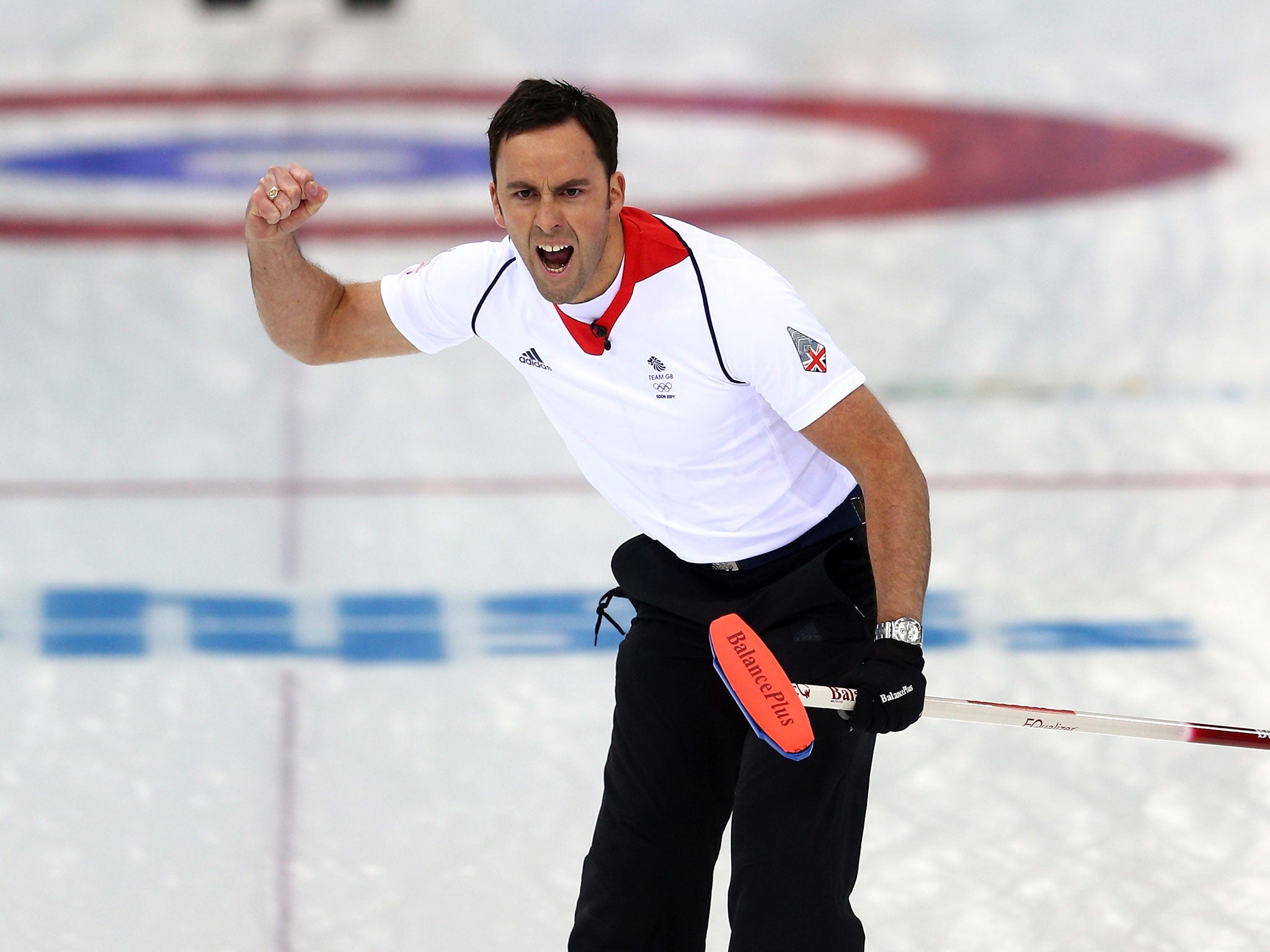Winter Olympics 2014: Team GB men's curlers prepare for final, with David Murdoch ready to show noisy rivals that silence is golden
Team GB are certain to secure a fourth medal on Friday afternoon - but will it be silver or gold?

It will not take long for the contrast to become clear. On one side, with that now familiar wry smile playing across his face, will be David Murdoch and his three British team-mates, as reserved off the ice as they are quietly composed on it. On the other side will be Brad Jacobs and his Canadian rink – loud, proud and over here to win gold. And if feelings are trampled en route then that’s too bad. Welcome to curling’s culture clash.
On Friday the two rinks face each other for gold in the Ice Cube. Canada expects it – curling is second only to ice hockey in the sporting pecking order – and are determined to own the top podium for a third successive Games. GB have won the gold only once, in the first Games of 1924.
The real contrast though comes in how they play the game. Both teams are fit – the days when a string of ash trays were laid alongside the ice are long gone – but Canada play with an aggression that has not won them many, or indeed any, friends. They are loud on the ice, bang brooms when a shot goes wrong or first-pump vigorously when things go right.
“The aggressive style we have seen from the Canadians, that’s something I don’t like about the sport,” said Soren Gran, Britain’s coach. “I don’t think it helps anyone. It doesn’t help the player or his team-mates. I tell my guys to work a different way.”
Not that the Canadians care a jot about what others think. “What works well for us is when we bring a lot of intensity,” said Jacobs. “That’s our style. That’s the type of people we all are. It’s almost like that switch that goes off in your head when you step on to the ice. You become a different person. Professional sports tend to bring that out in a lot of people.”
Not, it would seem, in Murdoch, although he is a different person to the one who came home from the last Winter Olympics. This is Murdoch’s third Games. He met his wife-to-be in the build-up to Vancouver 2010 but there was nothing to make the trip memorable in sporting terms.
In both his previous Games he was expected to deliver a medal and when, tense and tentative, he failed in Vancouver, he admits, “I was very low. We really believed we were going to win. You know when you come away from that and you’ve given absolutely everything and you think, well, if we’ve done all that and you still don’t achieve it, it puts you in a pretty dark place. It was over a year until I was over that.”
The arrival of Gran, once Sweden’s coach, provided the foundation for better times. He persuaded Murdoch to move from the family farm in Lockerbie to Stirling, where the rest of today’s team were training at the Scottish Institute of Sport. Gran had a plan. He liked what he saw in Murdoch – and in Greg Drummond, Scott Andrews and Michael Goodfellow he had three promising curlers. It meant taking the harsh decision to ditch their skip, Tom Brewster – here as a reserve – and replace him with Murdoch. Under Brewster, Scotland had twice won world championship silver. It was a gamble.
Gran has encouraged Murdoch to relax, and over the last two years the tension has gone out of his game. He is enjoying being on the ice again. “I try to encourage them to like and enjoy what they are doing and to believe in themselves,” said Gran. “They should make it happen rather than be worried about what might happen.”
On Thursday Murdoch could not stop smiling. He chatted happily after practice before watching the GB women win bronze, then pedalling back to the athletes’ village. He is guaranteed the Olympic medal he has wanted since he first curled at his father’s rink in Lockerbie.
“It’s the most incredible feeling, to do all that work and dedication and sacrifice and to finally realise your dream of getting there – it is actually hard to for your brain to take,” he said. “You never think you will ever get that chance. Now there’s the opportunity to go one better and that’s an even more mind-boggling thing.”
Murdoch’s career has had plentiful ups and downs – his bronze-medal match in 2006 was interrupted by a streaker with a rubber chicken as a loincloth – and his path to this final has been similarly erratic. The Brits lost their last three round-robin games, which meant a play-off against Norway. Murdoch won that with his “shot of the century” then the semi-final with the last stone of the match. This is a man in his moment.
“I got a tweet from Andy Murray today, which is pretty cool,” he said, and shook his head at the madness of it all. Then he looked up, grinned and added one more word: “Surreal.”
Subscribe to Independent Premium to bookmark this article
Want to bookmark your favourite articles and stories to read or reference later? Start your Independent Premium subscription today.

Join our commenting forum
Join thought-provoking conversations, follow other Independent readers and see their replies